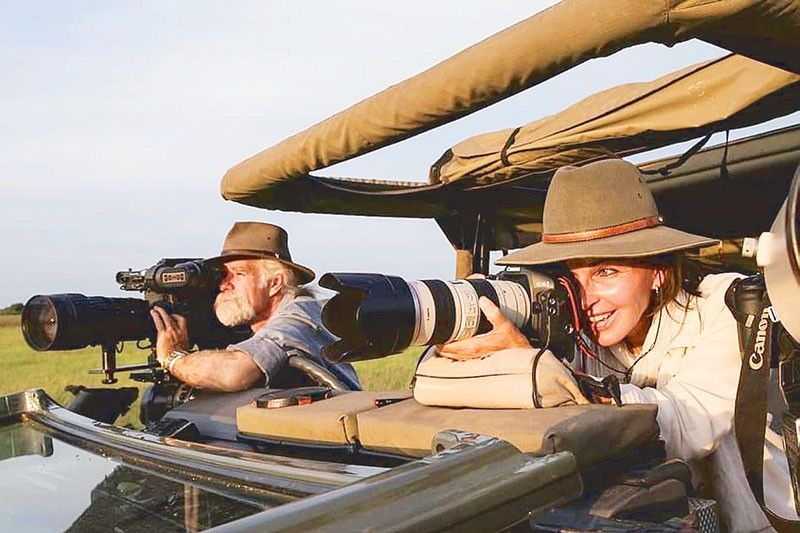How love led to extraordinary conservation work on big cats

Dereck and Beverly Joubert have been called the power couple of the conservation world, and rightfully so. Their love story led to a four-decade-long extraordinary work dedicated to nature’s fiercest felines — big cats.
It all started with Dereck and Beverly not only falling madly in love with each other, but also with the wilderness and wildlife of their birthplace, Africa.
“Beverly is quite feline and I fell in love with Beverly first of all, and I was quite worried about getting scratched in the beginning and so you have to deal with these things with some love and some caution,” Dereck told The STAR in a recent virtual one-on-one. “But we met in high school, and we wanted to go out and really discover Africa together. As soon as we were out of university and college, we went out to discover this continent that we were born on.”
Starting out in the early ‘80s after a couple trip to Botswana, the husband and wife’s journey as explorers, environmentalists and filmmakers has since been teeming with romance and adventure in the world of lions, tigers, leopards and cheetahs.
“To understand any natural ecosystem, you start with the top predators… If you want to look at the Arctic, you look at polar bears. If you want to look at the jungles of Asia, you look at tigers. And so in our context in Africa, we wanted to look at lions and then try to understand those,” said Dereck on how they began their careers studying, photographing and filming lions. “And once we took a stab at that, we realized that this was a subject that’s much bigger than just understanding them. We basically dedicated the rest of our lives to that.”
Dereck and Beverly are still at it 40 years after.
In partnership with National Geographic, which declared them as Explorers At Large, they have since established conservation programs like Big Cats Initiative to give grants for the protection of big cat species and made more than 25 films.
Nat Geo Wild is currently celebrating the Big Cat Week and Big Cat Month, where viewers are treated to the iconic works of the Jouberts from the 1990s to the 2000s. “We put them back into our shop, stripped them out, renarrated and remastered them entirely. Now, we are presenting these to the world for the first time,” said Dereck.
These include Revealed: Ultimate Enemies tonight at 8:30, about how animals are thrust together by forces of nature. In the aftermath of strange elephant deaths, the Jouberts are able to piece together a visually stunning story confirming their theory that lions are hunting elephants. Airing tomorrow, Feb. 25 at 8:30 p.m., is Revealed: Eye of the Leopard which follows the journey of a small, playful, eight-day-old cub into a skilled huntress. Named Legadema, the leopard would become the main inspiration for Big Cats Initiative. To be shown on Feb. 26, same time, is Revealed: Eternal Enemies, Jouberts’ Emmy-winning and groundbreaking film about the conflict between lions and hyenas.
These films are narrated by Hollywood star Jeremy Irons, whom Beverly described as “the most remarkable man and most superb actor.”
“The two going together and then the love for wildlife, to be able to do narration for our films, we are incredibly privileged and grateful for both (Jeremy’s) friendship and for the narration. It helps us illuminate big cats in Africa in a larger way because he gives the films gravitas at the same time,” she added.
Meanwhile, the annual TV programming event — Big Cat Week — is now on its 11th year. It was created with the intention to raise awareness on the drastic drop of big cats mainly in Africa, but also around the world, said Beverly.
“When we started the Big Cats Initiative and this annual show, people had sort of the impression that big cats were doing all right. That they were fun things to watch out in the savanna or around the world,” added Dereck.
According to the Jouberts, around the time they were born, about 450,000 lions existed, now there are only 20,000; leopards ranged from roughly 700,000 but now down to 50,000; and the cheetahs have plummeted from 45,000 to less than 7,000 in number.
“Really, they are declining, we are losing them at an alarming rate,” Beverly stressed. “We hope the films are going to touch people’s hearts and minds, and really fall in love with them the way we have,” she added.
When asked why they do what they do, Beverly said, “That’s something we ask ourselves all the time.”
They initially just wanted to showcase the beauty and wonder of African wildlife to the world, “but shortly after understanding that not everything was stable and there were times and wilderness areas where atrocities were happening, like poaching and illegal trade, that’s really what drives us forward today.”
The pandemic has further challenged their efforts. Dereck said, “It, in essence, shut down tourism and quite a lot of conservation is funded by tourism. A lot of the funding dried up. Secondly, a lot of the poaching is prevented by tourism, again, but by people being on the ground. With nobody traveling, nobody driving around in these remote areas, the poachers were able to have a bit of a field day and the result is we saw a massive increase in purchasing.”
Citing cheetahs also being taken as pets in the Middle East, Beverly said, “When we look at it, it really is us humans, what we are doing to their lands or individually to them, we admire their fur and want their fur. So, we gotta have a different mindset in so many ways — stop utilizing animals for our own pleasure and not be trading wildlife. Especially now, through the pandemic, we are very aware of zoonotic diseases. Flying a trophy or an illegal piece of bushmeat is really not a smart thing to do because it could create, once again, another global pandemic.”
Nevertheless, to address some problems caused by the pandemic, the Jouberts launched another program aligned with National Geographic in March 2020. Called Project Ranger, it is meant to keep frontline workers in the field. “Many of them were furloughed and governments couldn’t afford to pay them. The areas were left without anybody there. We now support rangers in over nine countries… in particular hotspots where poaching is really intense.”
After doing this for 40 years, what keeps them excited still? “Well in my case, Beverly keeps me excited (laughter),” said Dereck.
“Of course, I have my soul partner with me,” Beverly also said.
“But apart from being totally in love with each other, we are totally in love with Africa — these wild places and getting to understand them, to research and be explorers in every way. But as time went by, we started to notice that there were issues that we needed to confront. So, that really keeps us going today — the conservation side. We know that if we don’t speak out, we are going to move many animals to extinction, but we are also going to induce vast tracts of wilderness,” said Beverly.
Dereck readily agreed with his partner in life and conservation work. “It’s a combination of fascination, love and appreciation for what we’ve seen out there every day. And the deep concern that we will lose it and if we don’t collectively pay attention to it at this moment in time, we will lose it. Some of the predictions, rhinos for example, not big cats but lions not far behind, we have 10 years and they’ll be gone, and that’s a real concern for us.”
Nat Geo WILD (Cignal CH142/Skycable CH66 SD, CH193 HD) is featuring a special six-part series of Big Cat films by Dereck and Beverly Joubert, from Feb. 21 to 26 at 8:30 p.m.
- Latest
- Trending


















 Exclusive
Exclusive












